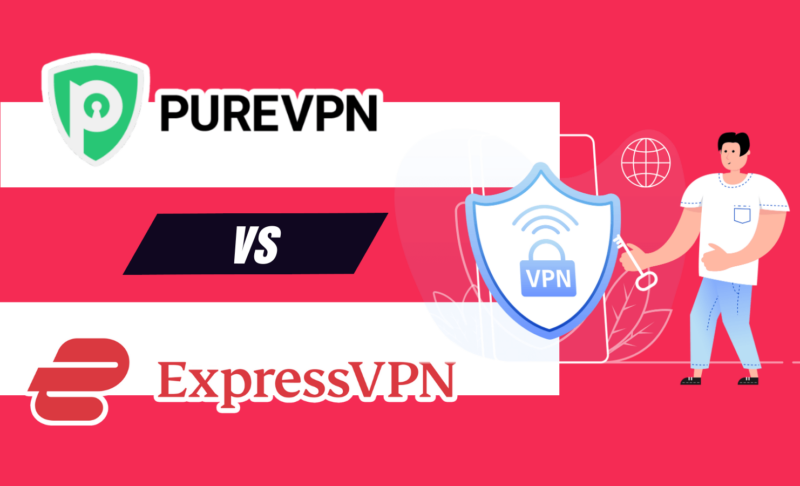ExpressVPN vs PureVPN in 2024: Side-By-Side Comparison of Features, Speed, Pricing & More
Our older tests demonstrated PureVPN had work to do, but recent examinations show it has been catching up. In our PureVPN vs ExpressVPN article, we’ll compare how the two VPNs currently stack up against each other.
Key Takeaways: ExpressVPN vs PureVPN
- In security and privacy, the main difference between ExpressVPN and PureVPN is that ExpressVPN has never provided user data to law enforcement.
- ExpressVPN outclasses PureVPN in speed, features and streaming performance.
- PureVPN has more servers, particularly in the Middle East and Africa, and is more affordable than ExpressVPN.
-
11/21/2023 Facts checked
We changed the format of the article and updated the features of both PureVPN and ExpressVPN.
-
11/30/2023
Updated the article to reflect ExpressVPN’s recent increase of 5 simultaneous connections to 8, as well as its expansion of server presence to 105 countries, previously 94.
Almost everyone who uses VPNs is familiar with ExpressVPN, which our team at Cloudwards considers the best VPN service. PureVPN may not be a top-tier VPN provider, but we appreciate how the company works hard to improve its services. We’ve updated our PureVPN vs ExpressVPN comparison to account for the latest changes.
You’ll have a clear picture of whether you should go with ExpressVPN or PureVPN by the end of this article. However, we still recommend trying the VPNs for yourself, as both have a money-back guarantee.
- 1
- : PayPal, Credit card, Bitcoin, PaymentWall
- :
- :
- :
- :
- :
Average speedDownload Speed85 MbpsUpload Speed8 MbpsLatency5 ms - 2
- : PayPal, Credit card
- : 10
- :
- :
- :
- :
How Did We Rate PureVPN vs ExpressVPN
The last time we rated these two providers, PureVPN suffered from slow speeds and even helped the FBI locate a cybercriminal by providing their personal information. While we don’t endorse crime, this act is a breach of privacy and cast doubt on PureVPN’s no-logs policy at the time.
Since then, PureVPN has improved its security, privacy and features to the point where it can go toe-to-toe with ExpressVPN. You can look at our PureVPN review and ExpressVPN review for deeper looks into both services.
Cloudwards Editor’s Choice: ExpressVPN
Even though it’s more expensive, the adage of “you get what you pay for” rings true, as ExpressVPN is the clear choice here. It’s better at unblocking streaming sites and is one of the fastest VPNs on the market. It also has a cleaner privacy record than PureVPN, a larger server spread and wider platform support.
PureVPN vs ExpressVPN: Comparison at a Glance
In this section, we’ll compare ExpressVPN and PureVPN across several categories, including pricing, features, performance and more.
| $6.66 / month(All Plans) 30-days money-back guarantee | $2.29 / month(All Plans) 31-days money-back guarantee | |
| Review | Review | |
| Payment methods | PayPal, Credit card, Bitcoin, PaymentWall | PayPal, Credit card |
| Accepts cryptocurrency | ||
| Simultaneous connections | 10 | |
| Supports split tunneling | ||
| Unlimited bandwidth | ||
| Free trial available | 7 days (mobile only) | |
| Refund period | ||
| Worldwide server amount | 3,000+ servers in 105 countries | 6,500 servers in 65 countries |
| Desktop OSes | Windows, MacOS, Linux | Windows, MacOS, Linux |
| Mobile OSes | Android, iOS | Android, iOS |
| Browser extensions | Chrome, Firefox, Edge | Chrome, Firefox, Edge |
| Can be installed on routers | ||
| Can access Netflix US | ||
| Can access BBC iPlayer | ||
| Can access Hulu | ||
| Can access Amazon Prime Video | ||
| Encryption types | 256-AES, ChaCha20 | 256-AES |
| VPN protocols available | OpenVPN, IKEv2, Lightway | OpenVPN, IKEv2 |
| Enabled at device startup | ||
| Allows torrenting | ||
| No-logging policy | ||
| Passed DNS leak test | ||
| Killswitch available | ||
| Malware/ad blocker included | ||
| Live Chat | 24/7 | 24/7 |
| Email support | 24/7 | 24/7 |
| Phone support | ||
| User forum | ||
| Knowledgebase |
Which Is Better: ExpressVPN vs PureVPN?
ExpressVPN remains the best VPN provider on the market. It has repeatedly proven its no-logs policy by undergoing multiple audits. Its features match or outclass PureVPN’s, especially its split tunneling, kill switch, fast speeds and universal torrenting availability. ExpressVPN is a great combination of privacy and security that we find hard to beat.
PureVPN has more VPN servers, two more simultaneous connections and a longer extended subscription. However, its privacy record pales compared to ExpressVPN’s, and its streaming performance seems inconsistent. Though it’s cheaper, we don’t find its subscriptions as worthy of your money as those from Surfshark (read our Surfshark review) and NordVPN (read our NordVPN review).
PureVPN has much more work to do to become one of the best VPNs. Though ExpressVPN wins this comparison, we’re still impressed with PureVPN’s efforts to catch up. We’ll update the comparison as we receive new updates from either provider.
We Recommend ExpressVPN If You Want…
- Access to All Popular Streaming Services: ExpressVPN can easily unblock streaming services, rotating its IP addresses fast enough to keep up with the latest geoblocks.
- A Beginner-Friendly Experience: ExpressVPN’s ease of use helps newcomers get used to a VPN within minutes.
- VPN Tools for Any Platform: ExpressVPN users have access to apps for various operating systems and devices, ensuring they can enjoy internet privacy anywhere.
We Recommend PureVPN If You Want…
- More Simultaneous Connections: PureVPN offers 10 simultaneous connections on every subscription, two more than ExpressVPN.
- A Cheaper Service: Compared to ExpressVPN, PureVPN is cheaper and has a longer extended plan.
- African and Middle Eastern Server Locations: PureVPN has more servers and locations in Africa and the Middle East than ExpressVPN.
If You Want to Consider Other Services, Check Out…
- 1
- : PayPal, Credit card, Google Pay, AmazonPay, ACH Transfer, Cash
- : 6
- :
- :
- :
- :
Average speedDownload Speed94 MbpsUpload Speed9 MbpsLatency3 ms - 2
- : PayPal, Credit card
- : Unlimited
- :
- :
- :
- :
Average speedDownload Speed93 MbpsUpload Speed9 MbpsLatency2 ms - 3
- : PayPal, Credit card, Bitcoin, cash
- : 10
- :
- :
- :
- :
- 4
- : Credit card
- : Unlimited
- :
- :
- :
- :
- 5
- : PayPal, Credit card, Cash, Bank Transfer, Bitcoin Cash, bank wires, EPS transfer, Monero, Swish, Giropay, Bancontact, Przelewy24, iDEAL
- : 5
- :
- :
- :
- :
Average speedDownload Speed74 MbpsUpload Speed7 MbpsLatency1 ms
PureVPN vs ExpressVPN: Similarities
ExpressVPN and PureVPN share many features. Check out what they have in common here.
Based in British Virgin Islands
PureVPN used to be based in Hong Kong, but its headquarters are currently in the British Virgin Islands (BVI). ExpressVPN is owned by Kape Technologies, a U.K.-based company, but is also based in the BVI. The BVI are a privacy-friendly country with no mandatory data retention laws. Thus, VPN providers in the BVI can legally avoid keeping logs on their customers.
In addition, the BVI protects data with “dual criminality.” Unless the evidence is needed for a legal matter that’s a crime in both countries, no one can access it. Therefore, it’s highly inconvenient for countries to ask for data from VPN providers based in the BVI. Our article on whether ExpressVPN keeps logs explains this in further detail.
Built-In Obfuscation
Obfuscation refers to how VPN services disguise their traffic to hide the fact that you’re using a VPN. Both PureVPN and ExpressVPN have built-in obfuscation on all their servers that kicks in when you connect. The main difference is that with PureVPN, obfuscation only activates on the OpenVPN protocol, while ExpressVPN has obfuscation no matter the protocol you choose.
Obfuscation allows users to tunnel their traffic past internet restrictions like the Great Firewall of China. It also prevents internet service providers (ISPs) from throttling connections for VPN users.
Fast Speeds
Our past experiences with PureVPN’s speeds weren’t positive, but its upgrade to 20 Gbps servers has improved connection speeds. ExpressVPN has always been a speedy service and often ranks in the top three fastest VPNs. At this point, you can use either VPN to change your IP address and not notice any significant speed drops or lags.
PureVPN’s network offers consistent upload and download speeds, but ExpressVPN is faster. It impressed us that distance didn’t introduce as much latency as we expected and that connecting to U.K. servers from the U.S. barely affected the download speeds.
Strong Security Features
Regarding VPN protocols and encryption ciphers, ExpressVPN and PureVPN are evenly matched. Both offer OpenVPN (TCP and UDP) and IKEv2, which are excellent protocols on which you can rely. IKEv2 is best for mobile devices and is faster at the cost of being slightly less flexible.
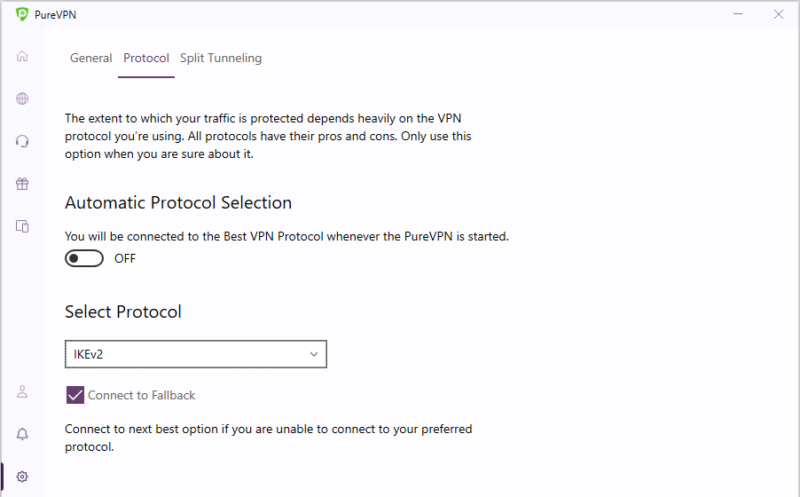
For OpenVPN and IKEv2, PureVPN and ExpressVPN use the AES-256 encryption protocol, the current industry standard. AES 256-bit is safe from attacks and has yet to be broken, as shown in our AES 256-bit guide.
However, there are also protocols these VPNs don’t share. ExpressVPN has a proprietary one called Lightway (both TCP and UDP), which uses both AES 256-bit and ChaCha20.
PureVPN doesn’t have Lightway but does offer WireGuard, which uses ChaCha20 as its encryption cipher. Therefore, in terms of VPN security, PureVPN can match ExpressVPN’s offerings.
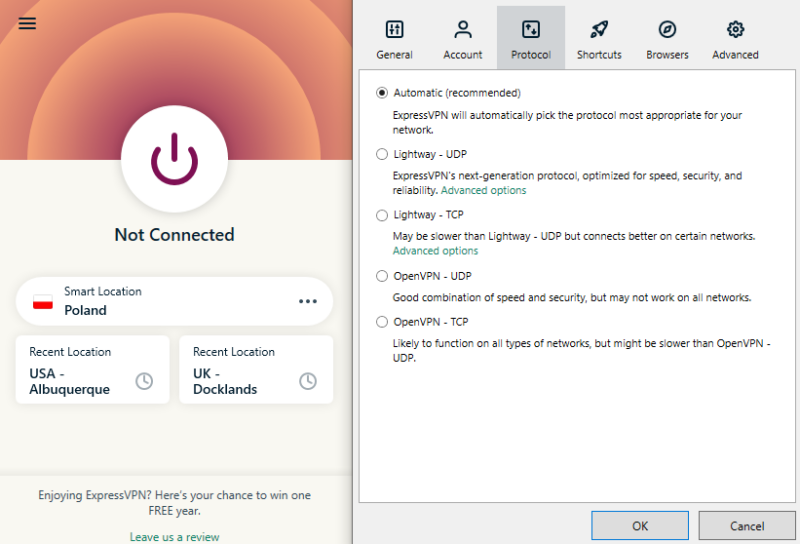
To prevent any data leaks, PureVPN and ExpressVPN have a kill switch that activates when the VPN connection is interrupted. The kill switch cuts your internet connection immediately and preserves your privacy. Our article on kill switches explains more about what they do.
Money-Back Guarantee
ExpressVPN and PureVPN offer money-back guarantees to let users try them and only continue if they’re satisfied. ExpressVPN has a 30-day money-back guarantee, and PureVPN has one that lasts for 31 days. Both offer access to their complete feature set.
If you want to try out a VPN for even longer, we recommend CyberGhost, which boasts a 45-day refund period (only on the extended plans). Learn more about it by reading our CyberGhost review.
Free Trials
Both PureVPN and ExpressVPN offer a free trial if you download the Android or iOS app and register on either operating system. You don’t have to pay anything for the seven-day trial, but you must still enter a credit card number or another preferred payment method. If you don’t cancel the trial in time, you’ll be charged for a premium subscription.
PureVPN also offers a seven-day paid trial on PC for 99 cents. You can register on mobile and use the account on PC and vice versa. We have a guide on the PureVPN free trial if you’re interested.
Simultaneous Connections
ExpressVPN accounts support eight simultaneous connections. Eight connections at once is usually enough for a single family, but if you need more, purchasing a new subscription is the only way.
PureVPN is more generous. Each subscription comes with 10 simultaneous connections, so you can share the VPN with friends and family without spending extra. Note that with both providers, you can also install the apps on as many devices as you want; only connections are limited, not installations.
Ease of Use
PureVPN has given its apps a graphic overhaul. The menus are now streamlined for easy navigation and have marked options. If you aren’t sure what something does, each option has a short explanation. We like how everything is kept within the same window on desktop.
ExpressVPN has been easy to use for years, with everything sorted into neatly organized sections. While the options menu and server list open new windows, everything is still easy to locate.
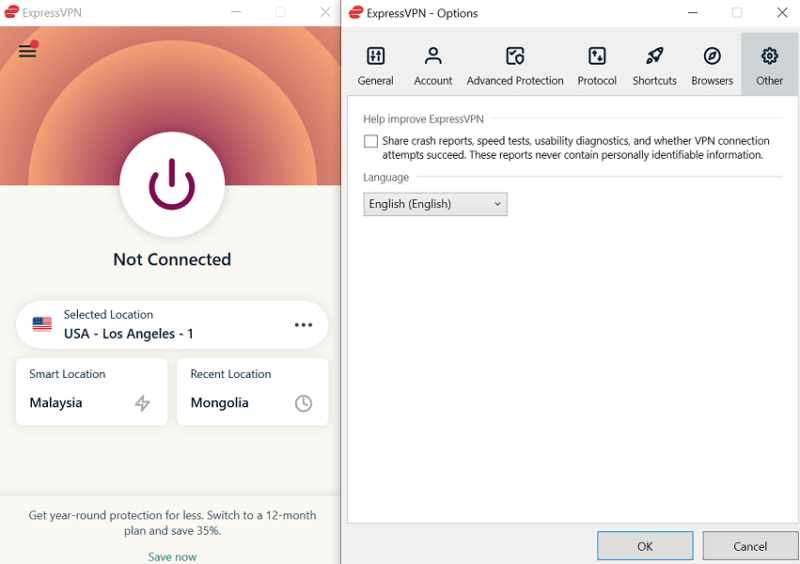
PureVPN vs ExpressVPN: Differences
Now that we’ve covered how PureVPN and ExpressVPN are similar, let’s check out the differences between the two VPN providers.
Split Tunneling
With PureVPN, you can select which apps go through the VPN tunnel and which remain unprotected. However, it only supports this feature on Android and Windows. ExpressVPN offers universal split tunneling on Windows, macOS, routers, Android and iOS, but you won’t be able to use split tunneling on macOS 11 and above.
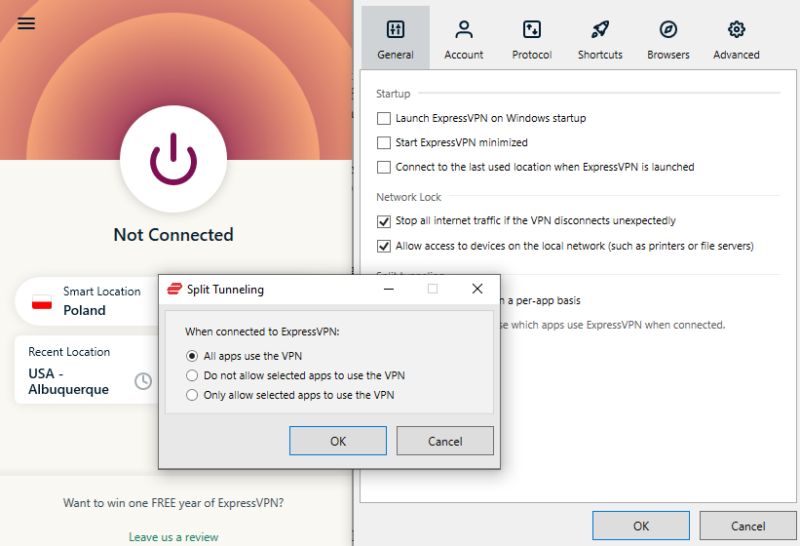
Split tunneling is helpful for users who don’t want every app to go through a VPN connection. For example, if you have a slower connection, lags and stuttering might make it hard to play video games unless you send them outside the tunnel. It can also help you access wireless devices on your network.
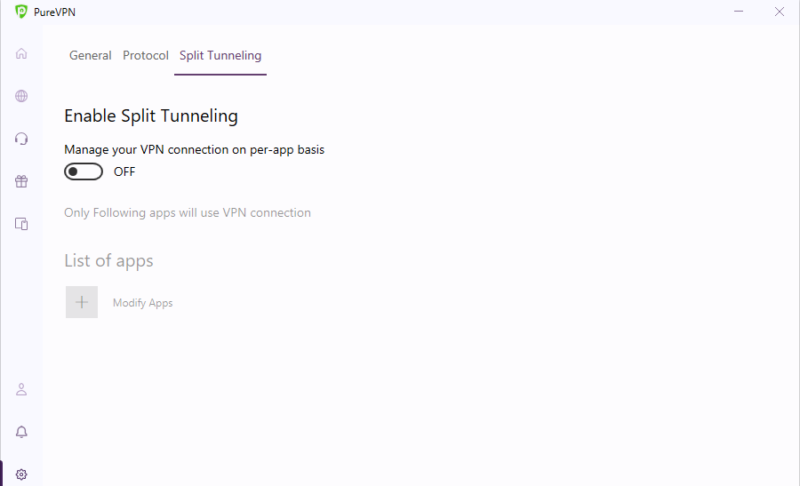
Pricing Plans & Subscription Lengths
ExpressVPN and PureVPN each have a one-month and one-year plan. ExpressVPN has a six-month plan as well, while PureVPN has a two-year plan that’s a lot cheaper per month than anything ExpressVPN offers.
ExpressVPN’s monthly plan costs $12.95, which isn’t worth your money. We recommend the six-month subscription or 15-month plan, going for $9.99 and $6.66 a month, respectively. All plans have a 30-day money-back guarantee.
PureVPN’s monthly plan is $12.45. The next subscription is the annual one, costing $3.75 a month for the first year. You’ll pay $2.29 monthly for the two-year plan with three free months.
- Only VPN. Two extra months free on 2-year plan.
- Unlimited GB
- 10
- Yes
- Adds password manager and file encryption software. Two extra months free on 2-year plan.
- Unlimited GB
- 10
- Yes
- Adds a personal privacy manager. Three extra months free on 2-year plan.
- Unlimited GB
- 10
- Yes
Though ExpressVPN’s monthly plan is expensive, its extended subscriptions are worth your money. We recommend getting the two-year plans with either VPN as doing so will save you money.
Server Locations
ExpressVPN has a larger server spread, but PureVPN’s server network is also extensive. It includes at least 166 locations across 105 countries. For comparison, Private Internet Access (read our PIA review) has over 35,000 servers in 91 countries.
ExpressVPN’s network provides 65 European locations to PureVPN’s 33, making it better for users who want European IP addresses. However, PureVPN has a larger presence in Africa and the Middle East. If you want to connect to a server in those areas, PureVPN has your back.
As with many reputable VPNs, you can contact customer support if you don’t see a country on the server list. Locations with higher demand may get added to the network later.
Server Types
PureVPN offers dedicated servers for torrenting, port forwarding and quantum resistance. Port forwarding lets users connect to a particular IP address on local networks when they’re connected to a VPN. It’s useful for tasks like accessing private video game servers. PureVPN also claims some of its servers are resistant to quantum computer attacks, but we haven’t seen solid proof.
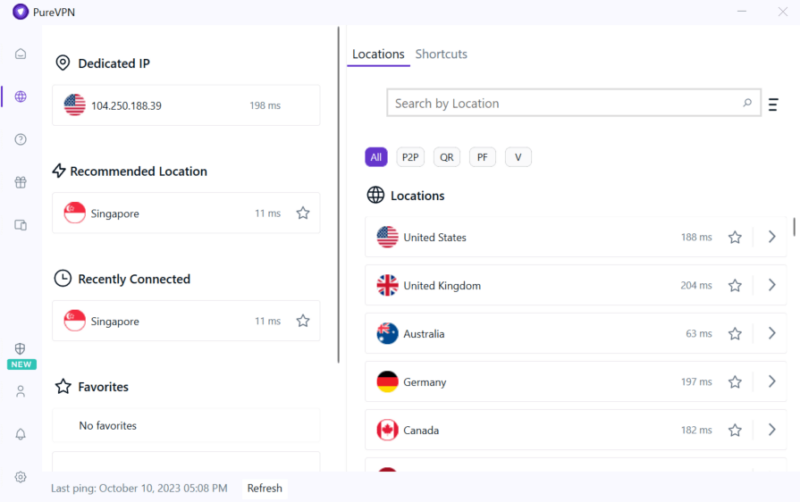
You can also connect to PureVPN’s virtual servers. Virtual servers are located outside the countries for which they’re labeled. Learn more about them by reading our physical vs virtual servers guide.
Unlike PureVPN, ExpressVPN doesn’t offer any dedicated servers for specific functions. You’re free to torrent files without restrictions on any of its servers, while PureVPN only allows torrenting on specific servers. There’s also no dedicated IP address add-on option like PureVPN has.
Streaming Performance
When we last took a look at PureVPN’s streaming performance, we weren’t able to access some of Netflix’s regions. Certain U.S. servers also couldn’t unblock Netflix, and no servers unblocked Amazon Prime Video or Hulu.
However, our more recent testing found that we were able to access Netflix without issues.
ExpressVPN has always been successful at accessing remote streaming libraries. In addition, ExpressVPN’s fast speeds make it better than PureVPN at reducing slowdowns and lags. It also sits on the top of our list of the best VPNs for streaming.
Customer Support
Both ExpressVPN and PureVPN have in-depth knowledgebases that contain accurate tutorials. In both cases, you can email customer support if you don’t mind waiting longer for a response.
However, there’s a noticeable difference in live chat support. PureVPN uses chatbots to help users before they can reach an agent, while ExpressVPN’s live support is composed purely of human assistance.
PureVPN’s agents are helpful once you can get to them, but we didn’t like the slower response times and lack of detail. While its support has improved, it still has a long way to go. ExpressVPN’s live agents handled everything efficiently, getting us in and out of support in no time.
Publicly Available Third-Party Audits
A reputable auditor can test a VPN’s no-logs policy and security infrastructure. ExpressVPN and PureVPN have ordered audits from trustworthy companies to prove their reliability and safety.
As of 2023, ExpressVPN has passed 16 audits, completing 12 in 2022 alone. KPMG tested the provider’s no-logs policy, while Cure53 has audited ExpressVPN’s Lightway protocol, apps and browser extensions. These audits prove ExpressVPN doesn’t keep connection logs and has reliable security features to keep you safe. You can even read the audit contents online.
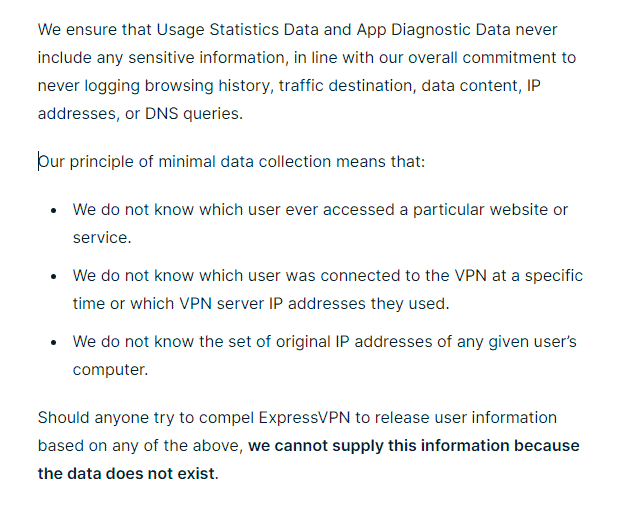
PureVPN doesn’t have ExpressVPN’s incredible record of ordering audits, but it did order one from KPMG in 2021. The company also opted to undergo an “always-on” audit, which lets KPMG perform audits unannounced to prevent PureVPN from tampering with the results. It’s reassuring to see these actions, but we aren’t happy with how the audit’s contents aren’t publicly available.
Built-In Ad Blocker
Just recently, ExpressVPN announced that it was finally implementing a built-in ad blocker feature, something it’s been lacking for a long time. PureVPN doesn’t have a similar feature, though you can get PurePrivacy — a separate app — on mobile devices to block trackers.
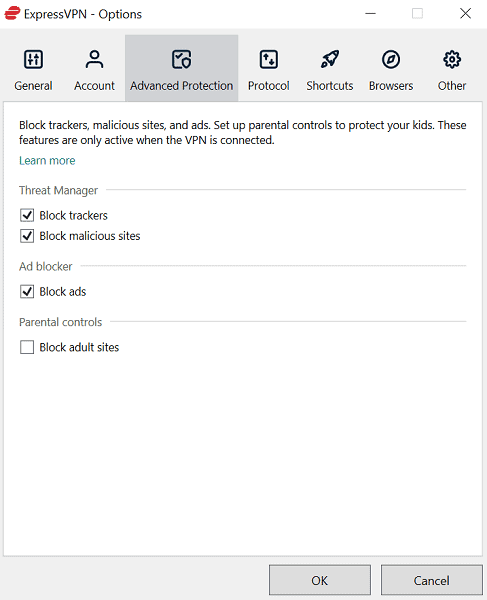
The Verdict: Why We Think ExpressVPN Wins Overall
The ExpressVPN vs PureVPN feature comparisons above show that ExpressVPN outclasses PureVPN in almost every area. Though ExpressVPN is the best VPN service around, there are still reasons to go with PureVPN (such as price), and we’re happy to see PureVPN working hard to compete with the best.
What did you think of our comparison? Have you used these VPNs before? Do you agree that ExpressVPN is the clear winner, or did we miss something about PureVPN that you think makes it pull ahead? Let us know in the comments below. Thank you for reading.
FAQ: ExpressVPN vs PureVPN Compared
PureVPN has improved its services lately, but it hasn’t reached ExpressVPN’s level yet.
No, PureVPN has limited features and mediocre speeds that prevent it from being the best VPN.
ExpressVPN is the best VPN right now, but NordVPN is a little faster and Surfshark has unlimited simultaneous connections. These two are the closest competitors ExpressVPN has.
No, PureVPN isn’t a Chinese company, nor is it owned by one.
